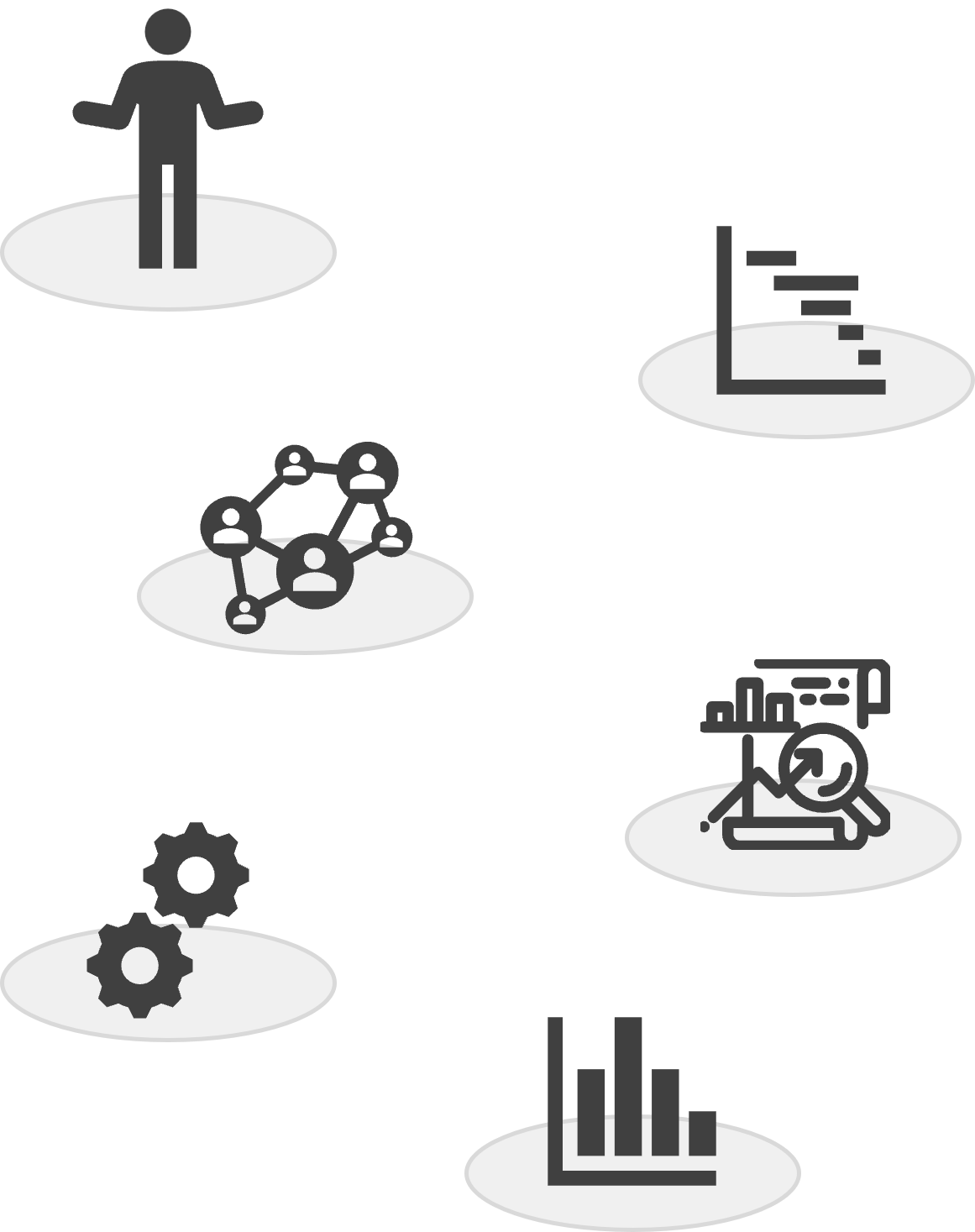
Changing the World of Project Business
Find out below how this vital but often neglected segment of business is undergoing a revolution.
The story impacting a $20 trillion economy
The story of project business impacts nearly every company on the planet, with trillions of dollars being wasted every year. One idea has the potential to revolutionize these organizations, and your audience should know about it.
Find more information on this story below:
- Project business is a $20 trillion economy.
- Yet, 91.5% of projects finish over budget or behind schedule.
- A lack of business systems for these organizations and a fragmented landscape of applications perpetuate the problem.
- Changing your point-of-view is the key to the solution.
- The impact of this paradigm shift is potentially astounding.
Who does this story impact?
Project Business is Everywhere
Project business encompasses a wide range of industries, including construction, energy, defense, aerospace, pharmaceuticals, and research and development, among others. These sectors collectively represent approximately one-third of the economy. However, the impact of this story extends beyond these companies to their customers.
Additionally, project business includes the capital project divisions of large enterprises such as Amazon, Walmart, Intel, and UPS. Last year, the Wall Street Journal reported that 464 out of the S&P 500 reported capital project expenditures.
According to the PMI Institute, the value of project-oriented economic activity is projected to exceed $20 trillion by 2027, and this estimate is considered conservative.
When we consider project business as encompassing not only these organizations but also their customers, third-party stakeholders, and government entities, the impact becomes significant, affecting nearly every company worldwide.
A $20 Trillion Economy
What is the extent of the problem?
91.5% of projects are not successful
A staggering 91.5% of projects are reported to finish over budget, behind schedule, or both, resulting in trillions of dollars wasted annually due to poor project business management.
It's increasingly common to hear about large projects, whether government-funded or otherwise, experiencing significant cost overruns and delays.
The core challenge lies in the fact that project organizations are essentially managing billion-dollar enterprises with spreadsheets and outdated, standalone desktop tools. This fragmented approach results in data silos, limited visibility, and a lack of control over project execution.
Essentially, project-driven organizations are lagging far behind in the digital transformation journey. According to McKinsey, these companies have remained entrenched in this outdated status quo for the past 50 to 60 years, with no viable technology solutions in sight.
The question arises: In what other industry or business sector would such inefficiency be considered acceptable?
$nbsp;
Why has the problem persisted?
No viable options for the whole business
Existing project solutions have been developed over the past three decades to tackle specific and narrow tasks such as scheduling, costing, resource management, and risk management. While they may be excellent at what they do, they mostly operate in isolation.
A project business encompasses all these functions and more, yet there has been little innovation in developing integrated business systems that address these comprehensive needs.
Further: interested parties benefit from the status quo and perpetuate the problem:
- Software vendors providing a narrow solution have a vested interest in continuing with the status quo, out of fear of becoming obsolete.
- Consultants benefit from the chaos they are constantly relied upon to fix and improve.
- An entire cottage industry of training exists around these different disciplines of project management, attempting to squeeze every last bit of optimization out of a fundamentally broken situation.
Silos perpetuate silos

What is the right solution?
What do project business leaders want? A project business system.
To solve this challenge, we must adopt the viewpoint of the project business leader. What do they require to effectively manage their organizations?
From this perspective, the solution becomes clear: project business leaders need a comprehensive system that integrates their people, processes, and data across all projects - or, a project business system.
A project business system fills a crucial gap in the market. Similar to how ERPs streamline operations for retail, manufacturing, and distribution businesses, project business systems perform the same function for project-driven organizations.
What is the potential impact?
Project business represents one of the last bastions of digital transformation worth trillions of dollars.
As the hype for digital transformation has waned, project business systems represent a real opportunity for digital transformation going forward, with the potential to reshape the $20 trillion project economy. By converting a substantial portion of the 91.5% of unsuccessful projects into successful ones, the net effect could inject trillions of dollars back into the economy.
How? The impact to these companies is not ambiguous. Project business systems offer tangible operational results that can drive up revenue and profitability.
How project business systems can transform these organizations:
- Eliminate silos of data and unnecessary applications
- Make business decisions with dynamic, real-time information instead of stale reports
- Minimize uncertainty in profitability through governed cost management
- Reduce the administrative burden on every person involved in projects
- Increase agility with real-time data to manage risk more effectively and reduce overruns and delays
- Reengineer processes and reshape teams to work together better
- Optimize utilization of revenue producing resources
- Maximize capacity for project work
As with any real transformation, the journey from current state to future state is not easy and will disrupt these organizations and the people within them who have relied on the status quo for decades.
About Adeaca
Adeaca’s mission is to make project business systems (PBS) the standard for managing the project-driven business of every company.
Just like ERP is the standard for managing company financials and CRM is the standard for managing customer relations, PBS should be the standard for managing project business.
What is unique about Adeaca is that we have adopted the project business leader’s point-of-view. We ask ourselves every day, what does the project business leader need to run their organization better?
That led us to create the first ever project business system that we call Project Business Automation (PBA). We have been building and improving this system since 2007 from this unique perspective. This has led us to make some remarkable innovations, but the real innovation is that we take into account the entire project business and the leader’s point-of-view while nearly everyone else does not.
We have deep roots in enterprise software and project business. We have combined our knowledge of both areas to create a comprehensive, enterprise-grade project business system designed to manage the processes and data of projects from end-to-end.
PBA is the leading example of what a project business system could be.
Key Experts at Adeaca

Daniel Bévort
Founder & CEO
Daniel founded Adeaca is 2007 to make his vision of business systems for project organizations a reality. Daniel runs the daily operations of Adeaca and the development of its solution, Project Business Automation (PBA) to fulfill this vision. Prior to founding ADEACA, Daniel was a principal architect of Axapta at Damgaard Data, which was acquired by Microsoft in 2002 for $1.6B and is now Microsoft’s flagship ERP offering. His development of business systems for traditional businesses helped him recognize that project-driven organizations needed the same thing but tailored to their needs - Adeaca was born.

Matt Mong
Chief Category Officer
Matt leads the evangelism of project business systems as a much needed category of solutions in the market. He knows the story of project business and how important project business systems are to their future. Prior to joining Adeaca, Matt forged a track record of building and leading effective marketing and communication efforts at other tech companies. First and foremost, Matt is about understnading and communicating the true value of technology.

Henrik Lerkenfeld
Vice President, Engineering
Henrik has deep roots in Microsoft Dynamics, having been part of the original Axapta team and Microsoft’s team after it was acquired. His knowledge of project industries and his systematic process design approach is a crucial component of Adeaca’s product success.

Josh Whitehead
Project Business Reengineering
Josh leads engagements with our customers to reengineer their business processes around the new project business system paradigm. He came to Adeaca with extensive expertise in project and program management in the defense industry, leading complex, multi-million dollar projects for DoD contracts.
Source Material
Please find more information below that supports the story of project business, its importance, its struggles, and where it needs to go.
Project Business Academy - Adeaca's Blog
Why do large project go over budget? – PWC
Companies’ Capital Spending Forecast – Wall Street Journal
How to manage the coming wave of investment in capital projects – McKinsey & Company
Projectification in Western economies: A comparative study of Germany, Norway and Iceland - International Journal of Project Management
The Value of The Project Economy – Project Management Institute
The Project Economy Has Arrived – Harvard Business Review
Capital investment is about to surge: Are your operations ready? – McKinsey & Company
Imagining Construction’s Digital Future – McKinsey & Company
Project Management Job Growth and Talent Gap – Project Management Institute
Standish Group Chaos Report – Standish Group
Pulse of the Profession – Project Management Institute
Connect With Us
MEDIA INQUIRIES
Please feel free to use any of this content to tell the story of project business. We only ask that you let us know when you do publish a story on this topic.
To contact us for more information, interviews, quotes, and more, please send all media related inquiries to media@adeaca.com.
CALL US
| US TOLL-FREE | +1 844 589 2053 |
| US DIRECT - FOR AMERICAS | +1 470 705 2676 |
| DUBLIN, IRELAND - FOR EUROPE | +353 1 566 6384 |
| MELBOURNE, AUSTRALIA - FOR APAC | +61 3 9067 5931 |
OUR HEADQUARTERS
Adeaca Corp.3280 Peachtree Road NE, 7th Floor
Atlanta, GA 30305
United States